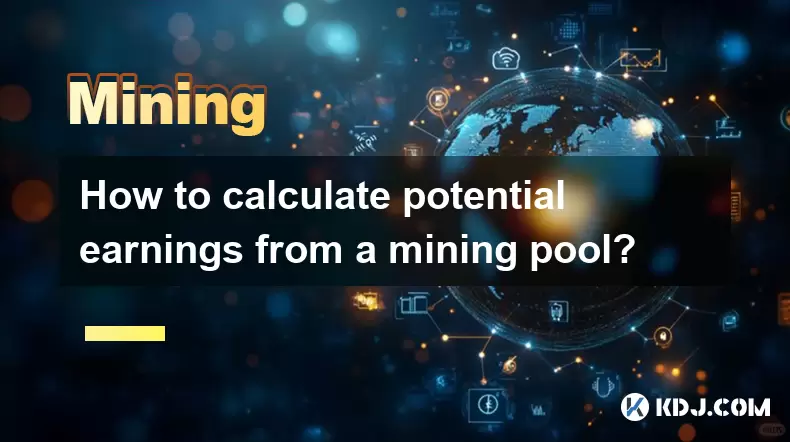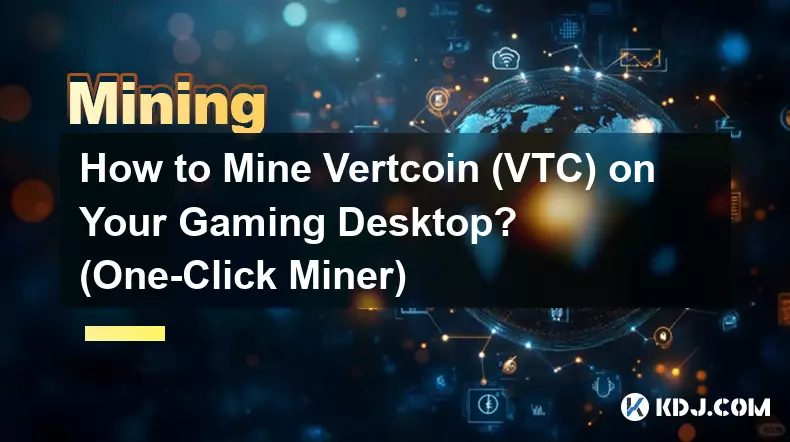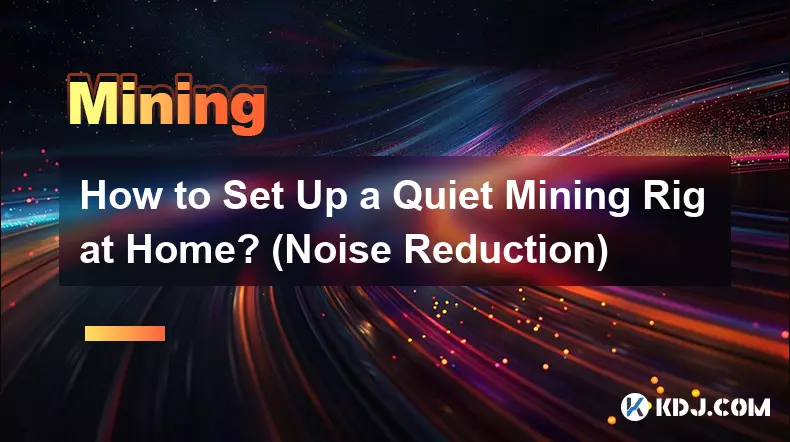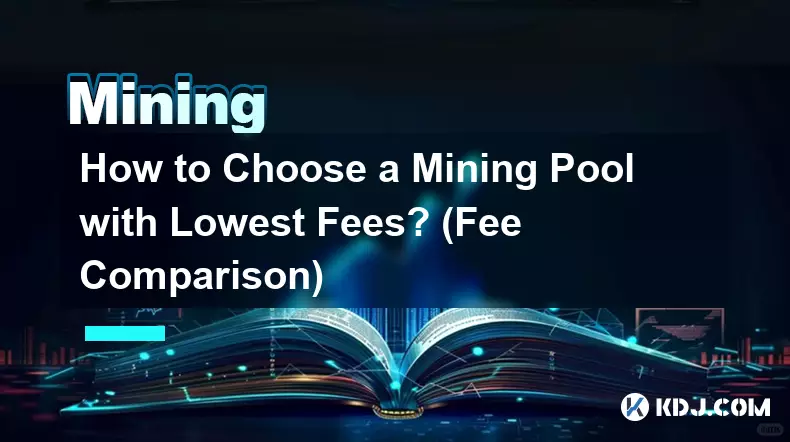-
 bitcoin
bitcoin $87959.907984 USD
1.34% -
 ethereum
ethereum $2920.497338 USD
3.04% -
 tether
tether $0.999775 USD
0.00% -
 xrp
xrp $2.237324 USD
8.12% -
 bnb
bnb $860.243768 USD
0.90% -
 solana
solana $138.089498 USD
5.43% -
 usd-coin
usd-coin $0.999807 USD
0.01% -
 tron
tron $0.272801 USD
-1.53% -
 dogecoin
dogecoin $0.150904 USD
2.96% -
 cardano
cardano $0.421635 USD
1.97% -
 hyperliquid
hyperliquid $32.152445 USD
2.23% -
 bitcoin-cash
bitcoin-cash $533.301069 USD
-1.94% -
 chainlink
chainlink $12.953417 USD
2.68% -
 unus-sed-leo
unus-sed-leo $9.535951 USD
0.73% -
 zcash
zcash $521.483386 USD
-2.87%
How to calculate potential earnings from a mining pool?
Joining a mining pool increases block-solving chances, but earnings depend on your hash rate share, pool fees, and electricity costs.
Jul 03, 2025 at 06:56 am

Understanding Mining Pool Earnings
To calculate potential earnings from a mining pool, it's essential to understand the mechanics behind how mining pools operate. A mining pool is a group of miners who combine their computational resources to increase the probability of solving a block and earning rewards. The reward is then distributed among participants based on their contributed hash power.
The first factor to consider is the block reward, which varies depending on the cryptocurrency being mined (e.g., Bitcoin, Ethereum). Each blockchain has its own reward schedule and difficulty adjustments that affect profitability.
Another crucial element is the pool fee, which is a percentage deducted from each miner’s share of the reward. This fee covers operational costs such as server maintenance and administrative support.
Lastly, the hash rate contribution of your mining hardware relative to the total pool hash rate determines your proportional share in the rewards.
Key Metrics for Calculating Potential Earnings
Before diving into calculations, gather the following metrics:
- Hash rate of your mining rig: Measured in hashes per second (H/s), kilohashes per second (KH/s), megahashes per second (MH/s), etc.
- Total pool hash rate: Usually displayed on the mining pool dashboard.
- Current network difficulty: Found on blockchain explorers or mining pool websites.
- Block reward: The amount of cryptocurrency awarded per block.
- Pool fee percentage: Typically between 1% to 3%, though some pools may charge more or offer zero fees with other conditions.
- Electricity cost per kWh: Essential for calculating net profit after expenses.
These values will be used in the formula to estimate daily or monthly income.
Step-by-Step Calculation Process
Determine your share of the pool: Divide your mining rig’s hash rate by the total pool hash rate.Example: If your rig contributes 50 MH/s and the pool’s total hash rate is 10,000 MH/s, your share is 0.5%.
Calculate expected blocks per day: Use the formula:
Expected Blocks = (Your Hash Rate / Network Difficulty) * Block TimeThen multiply this by the number of seconds in a day divided by the average block time to get daily expectations.Estimate daily reward: Multiply the expected number of blocks solved by the block reward.Example: If you expect to solve 0.2 blocks per day and the reward is 6.25 BTC, your gross daily reward is 1.25 BTC.
Apply your share to the reward: Multiply the daily reward by your share of the pool.Using the earlier example: 1.25 BTC * 0.5% = 0.00625 BTC.
Subtract pool fees: Deduct the pool fee percentage from your estimated reward.If the pool charges 2%, your final daily reward becomes 0.006125 BTC.
Convert to fiat currency: Multiply your daily earnings in crypto by the current market price to determine your fiat value.
Factoring in Electricity Costs
To determine real-world profitability, electricity costs must be factored into the equation. This involves:
- Power consumption of your mining rig: Expressed in watts (W).
- Hours of operation per day: Most miners run 24/7.
- Electricity cost per kilowatt-hour (kWh): Obtain this from your utility bill.
Use the following formula to calculate daily electricity expense:
Daily Cost = (Power Consumption / 1000) Hours Used Electricity Rate
Example: A 1,000 W rig running 24 hours at $0.10/kWh would cost:
(1000 / 1000) * 24 * 0.10 = $2.40 per day
Subtract this cost from your daily mining earnings to find your net profit.
Using Online Mining Calculators
For convenience, many miners use online calculators such as WhatToMine, CryptoCompare Mining Calculator, or NiceHash Profitability Tool. These platforms automatically pull live data like:
- Current network difficulty
- Cryptocurrency prices
- Mining hardware efficiency
- Pool fees
Input your hardware specs, location-based electricity costs, and desired mining pool to receive an estimate of your daily, weekly, and monthly earnings.
These tools also allow you to compare different cryptocurrencies and mining pools to optimize returns.
Frequently Asked Questions
Q1: Does joining a larger mining pool always result in higher earnings?Not necessarily. While larger pools solve blocks more frequently, your share of the reward may be smaller due to increased competition. Smaller pools may offer better payouts during lucky streaks but come with less consistent income.
Q2: Can I switch mining pools without losing my earnings?Yes, most mining pools pay out accrued earnings regardless of when you leave. However, some pools have minimum payout thresholds, so ensure your balance meets the requirement before switching.
Q3: How often are mining pool rewards distributed?This depends on the pool’s payout structure. Common methods include Pay Per Share (PPS), Proportional, and Score-Based Systems. Payout frequencies can range from hourly to weekly.
Q4: Are there any hidden fees in mining pools besides the stated pool fee?Some pools may impose withdrawal fees or delay payouts until certain thresholds are met. Always review the pool’s terms and conditions before committing resources.
Disclaimer:info@kdj.com
The information provided is not trading advice. kdj.com does not assume any responsibility for any investments made based on the information provided in this article. Cryptocurrencies are highly volatile and it is highly recommended that you invest with caution after thorough research!
If you believe that the content used on this website infringes your copyright, please contact us immediately (info@kdj.com) and we will delete it promptly.
- Ilocos Norte's Vibrant Festival Immortalized on New P100 Coin by BSP
- 2026-02-02 21:55:01
- LBank Elevates DeFi with GOLDEN FI (GLINK) Listing, Bridging Real-World Assets to the Blockchain
- 2026-02-02 21:30:02
- Beyond the HODL: Prediction Markets and Sports Betting Steal Bitcoin's Spotlight
- 2026-02-02 21:45:01
- Zama Lists on Multiple Exchanges, Airdrop Window Opens Amidst Strong Auction Performance
- 2026-02-02 19:05:01
- Bitcoin's Plunge Spurs Whale Activity Amidst Liquidity Crunch: A New York Take
- 2026-02-02 19:10:02
- Token Market Evolution: Digital Finance and RIV Files Usher in Era of Institutional Trust
- 2026-02-02 19:05:01
Related knowledge

How to Spot a Cloud Mining Scam? (Red Flags to Watch For)
Feb 02,2026 at 08:20am
Unrealistic Return Promises1. Platforms advertising guaranteed daily returns above 1–2% without disclosing underlying hardware, electricity costs, or ...

How to Earn Passive Income with DePIN Mining? (New Trend 2026)
Feb 01,2026 at 12:40pm
Understanding DePIN Mining Mechanics1. DePIN mining relies on real-world infrastructure participation rather than computational hashing. Users deploy ...

How to Mine Vertcoin (VTC) on Your Gaming Desktop? (One-Click Miner)
Feb 02,2026 at 03:39am
Understanding Vertcoin's Mining Algorithm1. Vertcoin uses the Verthash algorithm, which is intentionally memory-hard and designed to resist ASIC domin...

How to Set Up a Quiet Mining Rig at Home? (Noise Reduction)
Feb 01,2026 at 11:00pm
Acoustic Enclosure Design1. Use rigid, dense materials such as MDF or acoustic-grade plywood for the enclosure walls to block mid-to-high frequency no...

How to Choose a Mining Pool with Lowest Fees? (Fee Comparison)
Feb 02,2026 at 02:39am
Understanding Mining Pool Fee Structures1. Pool operators charge fees to cover infrastructure, maintenance, and administrative costs. These fees manif...

How to Mine Bitcoin on Mac (M1/M2/M3)? (Software Tutorial)
Feb 01,2026 at 07:19pm
Understanding Bitcoin Mining on Apple Silicon1. Bitcoin mining relies on solving cryptographic puzzles using computational power, and Apple’s M1, M2, ...

How to Spot a Cloud Mining Scam? (Red Flags to Watch For)
Feb 02,2026 at 08:20am
Unrealistic Return Promises1. Platforms advertising guaranteed daily returns above 1–2% without disclosing underlying hardware, electricity costs, or ...

How to Earn Passive Income with DePIN Mining? (New Trend 2026)
Feb 01,2026 at 12:40pm
Understanding DePIN Mining Mechanics1. DePIN mining relies on real-world infrastructure participation rather than computational hashing. Users deploy ...

How to Mine Vertcoin (VTC) on Your Gaming Desktop? (One-Click Miner)
Feb 02,2026 at 03:39am
Understanding Vertcoin's Mining Algorithm1. Vertcoin uses the Verthash algorithm, which is intentionally memory-hard and designed to resist ASIC domin...

How to Set Up a Quiet Mining Rig at Home? (Noise Reduction)
Feb 01,2026 at 11:00pm
Acoustic Enclosure Design1. Use rigid, dense materials such as MDF or acoustic-grade plywood for the enclosure walls to block mid-to-high frequency no...

How to Choose a Mining Pool with Lowest Fees? (Fee Comparison)
Feb 02,2026 at 02:39am
Understanding Mining Pool Fee Structures1. Pool operators charge fees to cover infrastructure, maintenance, and administrative costs. These fees manif...

How to Mine Bitcoin on Mac (M1/M2/M3)? (Software Tutorial)
Feb 01,2026 at 07:19pm
Understanding Bitcoin Mining on Apple Silicon1. Bitcoin mining relies on solving cryptographic puzzles using computational power, and Apple’s M1, M2, ...
See all articles










































































